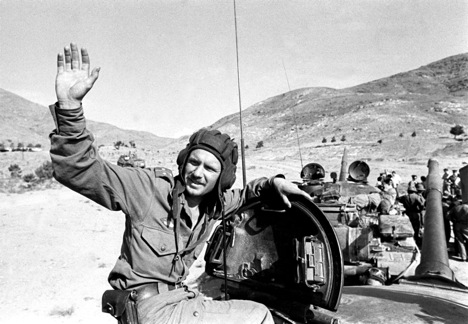NATO keen to learn from the Soviet experience in Afghanistan

Representatives of the alliance have sought information about Soviet troop pullout from Afghanistan. Source: ITAR-TASS
NATO has decided to study the Soviet Union’s experience in Afghanistan ahead of its own troop pullout from the country in 2014.
Representatives of the alliance have approached Moscow with a request to share various materials and analysis of the withdrawal of Soviet forces from Afghanistan in 1989. NATO sources say an official request to that effect has not been made so as not to create an impression that the current NATO mission in Afghanistan can in any way be equated to the Soviet campaign in the country. Nevertheless, several NATO sources have said that representatives of the alliance have sought information about Soviet troop pullout from Afghanistan.
A source in the Russian General Staff has also confirmed these reports. The source said that NATO had approached the Russian Ministry of Defence “via military-diplomatic channels” in late-March with a request for information about the withdrawal of Soviet troops from Afghanistan in 1989. NATO is said to be especially interested in meeting the people who were directly involved in those events, and in conducting a joint analysis of the Soviet MoD’s documents pertaining to the period.
In addition, the source has told the Kommersant newspaper that NATO wants to compare the mobilisation capability of the Soviet Union at the end of the Afghanistan campaign with its own capability at this time so as to have a “clearer picture” and “to understand what mistakes were made, where, and when".
Related:
The way forward for Afghanistan
Soviet soldier, missing for 33 years, found in Afghanistan
Ready to support Afghanistan, but no Russian troops - Ambassador Avetisyan
NATO wants to take Soviet experience into account during the withdrawal of its own forces from Afghanistan; incidentally, the size of those forces exactly matches the Soviet troop numbers in the country in 1988.
“Essentially, we have no reason to say no to our partners,” a source in the Russian MoD has said. “If this information proves useful to them, it will help us to strengthen our dialogue.” The source also said that achieving stability in Afghanistan “is a priority not only for NATO but also for Russia and the CSTO.”
According to the Russian sources with contacts in the NATO-Russia Council, this is not the first time NATO is showing interest in the subject. Similar unofficial requests for information about the Soviet experience in Afghanistan have been made in the past. In late-2011, the topic was discussed during a meeting between the then-Moscow Region governor, Boris Gromov (who led the Soviet troop pullout from Afghanistan) and a NATO delegation led by Admiral James Stavridis, head of the NATO forces in Europe.
Meanwhile, NATO representatives are trying to keep under wraps their interest in Soviet experience ahead of the 2014 pullout from Afghanistan. General Knud Bartels, who visited Moscow in December, said on the record that NATO had not used the Soviet Union’s experience in its planning for the upcoming troop withdrawal.
Russian sources explain such a stance by saying that “NATO probably does not want any parallels to be drawn between its campaign in Afghanistan and the Soviet campaign, which has always been described in the West as Soviet occupation”. That is the likely reason why the request for information NATO made in March was unofficial.
It is worth noting that at about the same time the British media published extracts from a report commissioned by the country’s MoD and headlined “Lessons from the Soviet transition in Afghanistan.” The report argues that NATO is repeating the Soviet Union's mistakes during its own Afghan mission.
It says, in particular, that both the military campaigns aimed to foist alien ideology in the Afghans. In the case of the Soviet Union the ideology was communism, and in the case of NATO democracy. According to British analysts, in both cases the central Afghan government backed by external forces was “corrupt and unpopular”, while the rebels enjoyed support among broad sections of the public.
Russian experts say that NATO’s decision to learn from Soviet experience is entirely justified.
“At the level of consultations, this is a very promising area of cooperation,” says Dmitry Danilov, head of the European Security department at the Russian Academy of Sciences’ Institute of Europe. “Moscow has a lot of experience in Afghanistan; it understands the internal dynamics in the country, including the balance of power and relations between the various Afghan tribes. Much has changed in Afghanistan since Soviet times – but the continuity remains, so Russian experience there should not be underestimated.”
Natalya Khanova, an expert with the Centre of Contemporary Afghan Studies, offers a slightly different angle on the situation. She believes that NATO is “trying to learn from Soviet experience because it fears that the situation in Afghanistan will soon come to resemble the state of affairs after the Soviet troop pullout.”
According to our sources, the issue will be discussed in detail on May 23-24 during an international security conference to be hosted in Moscow by the Russian MoD.
First published in Russian in Kommersant.
All rights reserved by Rossiyskaya Gazeta.
Subscribe
to our newsletter!
Get the week's best stories straight to your inbox